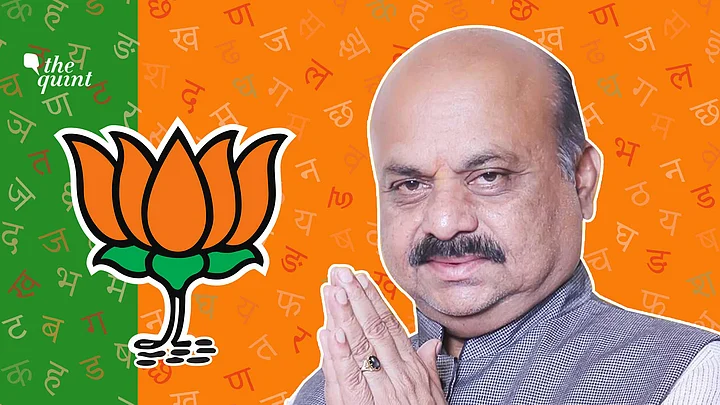A day after a squabble broke out between Kannada actor Sudeep Kiccha and Ajay Devgn on whether Hindi is India's 'national language', Karnataka Chief Minister Basavaraj Bommai on Thursday, 28 April, came to the support of Sudeep and made a case for linguistic diversity.
"Whatever Sudeep has said is correct. After the formation of states on linguistic basis, languages got importance there (in those regions). That is supreme. The same has been said by Sudeep, which is right. Everyone should accept and respect it," Bommai told reporters in Hubballi.
"Hindi is no more a national language. They (Bollywood) are doing pan-India films today," Sudeep Kiccha had said on Twitter on Wednesday, after which Devgn had insisted, "Hindi was, is and always will be our mother tongue and national language."
While Hindi is certainly not the national language of India but an "official language" as per the Constitution, the BJP has often touted it as the lingua franca in the past for its ‘unifying value'.
Bommai's stance in the favour of regional languages over the furtherance of Hindi as a blanket tongue across India, even as it falls in line with the rhetoric advanced by other southern leaders, marks a sharp departure from the BJP's position.
The BJP's Linguistic Nationalism and Politicking Over Hindi
Hindi, being the most spoken language in India, has been heralded by the BJP as a 'national language' on numerous occasions in the recent past.
The party once used to vociferously advocate Hindi but it had kept it on the back burner as it expanded its presence in various non-Hindi speaking states. It is after the BJP gained a comfortable majority across the country that its campaign in this direction became more pronounced.
Notably, Home Minister Amit Shah is among the party's most vocal advocates for the predominantly North Indian language.
As recently as earlier this month, Shah had said that when citizens of different states communicate with each other, "it should be in the language of India." "Now the time has come to make the official language an important part of the unity of the country," he had stated at a Parliamentary Official Language Committee meeting.
In a 2019 tweet which had met with immense backlash, Shah had propounded that Hindi should become part of the Indian identity.
"India is a country of different languages and every language has its own importance but it is very important to have a language which should become the identity of India in the world. If one language can unite the country today, it is the widely-spoken Hindi language," he had written on Twitter on the occasion of Hindi Day.
Many residing in southern Indian states had taken offence to Shah’s statement that was seen as an imposition of Hindi language – the language without which, it seemed to have been posited, the Indian identity would be rendered incomplete.
The saffron party's championing of Hindi as the lingua franca has seeped into its government's policies as well.
A draft of the National Education Policy furthered by the central government in 2019 had provided that Hindi should be taught mandatorily across the country. The NEP draft had concerned speakers of regional languages across non-Hindi speaking states.
A Home Ministry order, issued a day after Prime Minister Narendra Modi assumed office for the first time on 26 May 2014, had asked government officials to "give priority to Hindi".
"It is ordered that government employees and officials of all ministries, departments, corporations or banks, who have made official accounts on Twitter, Facebook, Google, YouTube or blogs, should use Hindi, or both Hindi and English, but give priority to Hindi," it had stated.
The BJP's 'Hindi nationalism' has met with strong defiance from the South at every step.
'Hindi Was Never & Will Never Be National Language,' Say Southern Leaders
While Bommai may have articulated his stand in the favour of regional languages, he has already been beaten to it by his rivals Siddaramaiah and HD Kumaraswamy.
Bommai is in a tricky position as he has to champion the cause of the Kannada-speaking state without criticising his party's national position.
"Hindi was never and will never be our National Language. It is the duty of every Indian to respect linguistic diversity of our country. Each language has its own rich history for its people to be proud of. I am proud to be a Kannadiga!!" Leader of the Opposition in Karnataka and senior Congress leader Siddaramaiah said in response to Devgn's espousal of Hindi.
Janata Dal (Secular)'s HD Kumaraswamy backed Sudeep's remark, and called the Singham actor a mouthpiece of the ruling party.
"Ajay Devgn blabbered as a mouthpiece of BJP's Hindi Nationalism of one nation, one tax, one language and one government," Kumaraswamy said in a tweet, adding #stopHindiImposition.
Leaders from southern India, where regional languages are spoken more commonly than Hindi, have raised opposition to the BJP's championing of Hindi as a 'national language' in the past as well.
After Amit Shah's 2019 tweet, DMK chief and incumbent Tamil Nadu Chief Minister MK Stalin had said, "It’s shocking. It will surely affect India’s unity. I would urge him (Amit Shah) to take back that view of his," Times of India had reported. Stalin had also opposed the “hegemonic imposition” of Hindi when the controversy over the NEP draft had flared up.
Late Tamil Nadu politician Jayalalithaa had also written to Prime Minister Modi in 2014, stressing that his government's emphasis on Hindi is "a highly sensitive issue and causes disquiet to the people of Tamil Nadu who are very proud of and passionate about their linguistic heritage."
In 2017, a group of activists protesting against Hindi imposition in Bengaluru had blackened Hindi signs at various metro stations in the city. The protesters from Karnataka Rakshana Vedike (KRV) had been agitating against Bengaluru Metro's adherence to a three-language (Kannada, English, Hindi) formula.
